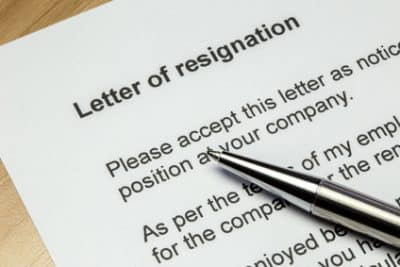If you intend to leave your job, it is usual to provide your employer with 2 weeks’ notice as a professional courtesy. While you are not required by law to give notice in most situations, supplying your company with a 2-week notice letter will give your managers and coworkers ample time to take over your job or find a suitable replacement. It is the usual resignation period in the United States and will prepare the way for your exit. Follow our guide and learn how to write a 2-week notice resignation letter with the sample letters attached.
What is a 2-Week Notice Letter?
When you quit a job, it is normal to notify your employer in the form of a resignation letter (at least 2 weeks in advance). This provides your organization time to fill your position while also allowing you to finish any unfinished work and transfer over any duties. You should notify your boss of your intention to leave as soon as you accept the job offer from your new employers, or as soon as practicable thereafter. The longer you wait, the longer it will be before you can depart, perhaps delaying any new business.
Check your employment contract before submitting your 2-week notice. Some companies may demand a lengthier notice period, or you may be required to undertake additional tasks before you may legally quit.
Why should you write a 2-Week Notice Letter?
There are two main reasons why you should write a 2-week notice letter. First and foremost, this letter is a polite manner of informing your employer that you intend to quit your current work. People leave jobs and go on to new ones all the time. Ensure that your employer will be able to speak positively about your departure during this procedure. For example, leaving your job abruptly and without notice may put your employer in a tough position. This may limit your ability to utilize your current employer as a reference for future jobs, or it may expose you to the possibility of a potential employer learning about your unprofessional departure.
In many circumstances, your notice will provide your employer with enough time to settle any accounts in your name or to guarantee you receive final financial information, such as for retirement accounts or back pay. Your employer may also require time to list your previous job and find a suitable applicant to replace you.
The second reason you should send a 2-week notice letter is to have a written record of your intention to resign. This document can be used for a variety of objectives, including determining why employees choose to leave or keeping legal records.
The manner in which you quit your job may also have an impact on your future job success. Whatever the reason for your departure, you should avoid making a terrible impression throughout the resignation process.
Important Considerations before Submitting your 2-Week Notice Letter
Before you file your 2-week notice letter, be sure you’ve investigated all options before leaving your current job.
#1. Concerns About Employment
- Do you have another job lined up, and if so, when will it start?
- How much free time do you have in between jobs?
#2. Financial Concerns
- What effect will quitting your job have on your bank account (i.e., your capacity to pay rent and other expenses)?
- Will you be filing for unemployment, and have you notified your state?
#3. Social Concerns
- Are you leaving a large task behind that will fall into the hands of an unwary coworker?
- Do you have any unresolved office squabbles? (Kidding, there’s no need to settle the score at this stage.)
#4. Human Resources Concerns
- How will you manage your remaining paid time off: will you use it all before giving your 2 weeks’ notice letter, will you cash it out, or will you forego it?
- How will you manage the company’s property, money, and files?
#5. Problems in Life
- What effect will this have on your health insurance (e.g., higher premiums)?
- Who do you need to notify if you receive a work permit?
- Have you finalized the details of your 401(k)?
As you can see, quitting a job is more difficult than you might expect. Even if you overcome all of these issues, you will still have to deal with the needs of your HR department and your manager.
- The HR department may request that you reassess your role.
- A manager may request that you outline your work practices or assist in training someone to take over your tasks.
Always give two weeks’ notice, no matter what your position is. Your manager, coworkers, and the HR department will appreciate your professionalism in providing an accurate leave date.
Also, don’t be caught off guard if your manager decides to fire you right away. Although your employer will only end up hurting themselves, they may also harm you in the near run. Prepare for the possibility by backing up key files and creating work examples for your portfolio.
When Should You Give 2 Weeks Notice?
You may not be able to provide 2 weeks’ notice, or even any notice at all, in some cases. Your company may not want you to stay during the notice period in some cases.
Company regulations vary, and some employers may require you to depart immediately after submitting your resignation.
Most, on the other hand, will appreciate you remaining on for a few weeks to aid with the changeover. This can be advantageous to you as well since it allows you to demonstrate your professionalism and leave the job on a high note.
Read on for advice on how to write a resignation letter that gives your company a 2-week notice. Then, look through a sample 2-week notice resignation letter and email. Use these examples as a starting point for your own resignation letter.
What should a 2-Week Notice Letter Contain?
- Your company information, as well as the name of the person to whom you are writing the letter.
- Your intention to give notice and the date you will depart.
- A brief expression of gratitude.
- What you should do next.
- Your signature and name.
Tips for Writing a Two-Week Notice Resignation Letter
- Use a Business Letter Format: To make your letter look professional, use a business letter format. Include your contact information, the date, and your employer’s contact information at the beginning of your letter.
- Day: The most significant thing to include in your letter is the date you will be departing the firm. You can either specify a precise departure date or mention that you will depart two weeks from the present day.
- Keep It Short: You don’t need to add anything other than the fact that you’re departing and the date of your last day of work.
- Consider Saying Thank You: If you like, you may also thank the company for the chance and the experience you gained while working with them.
- Be Positive: As with any resignation letter, brevity is beneficial, and it’s better to avoid mentioning anything unpleasant about your company or coworkers. Always maintain a professional demeanor with everyone. You never know who might cross your path in the future.
- Consider Volunteering to Assist: Consider offering to assist with the transition process. You can contribute anything specific, such as assisting in the training of a new employee, or you might simply give your general assistance.
- Send the Letter to the Correct Individuals: Send a copy of this letter to your company as well as to your human resources (HR) office.
- Consider a Resignation Email: Instead of a formal letter, you might send a resignation email message. The email’s content will be comparable to that of a letter. Include your name and the word “resignation” in the subject line of the email.
How to Write a 2 Week Notice Letter
There are five simple steps to write a professional 2-week notice letter.
#1. Address the letter.
Begin by mentioning the date. Your company information, as well as the name of the person to whom you are writing the letter
#2. Declare your resignation.
Get right to the point of the letter in the first paragraph. Declare that you will be resigning from your job in two weeks. Include the date of your last day of employment with the organization.
#3. Show Gratitude
In the second paragraph, write your gratitude to the company for the opportunity, time, and commitment it has given you. You may also want to give a brief explanation of your resignation, i.e., the reason for your decision.
#4. Mention your next steps briefly.
In a brief closing paragraph, inform your employer that you intend to complete your obligations to the greatest standards until your last day of work, and offer your assistance, if needed, throughout the transition time.
#5. Please sign off.
Sign your name and close the letter with a formal ending, such as “sincerely.”
The Benefits of Giving 2-Week Notice Letter
If you are leaving your current job to seek a new profession, you will want to go on good terms. The most efficient approach to quitting a job on good terms is to give your employer two weeks’ notice and to fulfill your obligations to the best of your ability during that notice.
If you do not give your employer enough notice, they may not have enough time to recruit a replacement or train someone for the position. This may cause a departmental slowdown and, as a result, have an impact on corporate performance. The firm may then opt not to give you a reference letter or a favorable recommendation for future career possibilities.
Sample 2-Week Notice Resignation Letter and Emails
Examine how to write a 2-week notice resignation letter and the sample letters below.
Sample Resignation Letter with 2-Week Notice #1
Your Surname
Your Home Address
City, State, and Zip Code
Your Contact Information
Your Email Address
Date
Name
Title
Organization
Address
Zip Code, City, State
Dear Mr./Ms./
I am writing to announce my resignation from Company Name, effective two weeks from today.
This was not a simple decision. The last ten years have been extremely fruitful. I’ve enjoyed working for you and leading a highly successful team committed to delivering a high-quality product on schedule.
Thank you for the possibilities for development you’ve given me. I wish you and your firm the best of luck. Please let me know if there is anything I can do to assist you during the move.
Sincerely,
Your Initials (hard copy letter)
Your Name as Typed
Sample Resignation Letter with 2-Week Notice #2
Your Surname
Your Home Address
City, State, and Zip Code
Your Contact Information
Your Email Address
Date
Name
Title
Name of the Company
Address
Zip Code, City, State
Dear Mr./Ms./
I am writing to inform you that I am resigning from my work as an analyst at ABC Company. August 20, 20XX will be my last day.
Please let me know how I may help you in my last two weeks at the company. I would be delighted to train an incoming employee or help with the transition in any other manner.
Thank you very much for all of the professional chances you’ve given me over the last three years. I wish you and your firm the best of luck.
Regards,
Your Initials (hard copy letter)
Your Name as Typed
Sample Resignation Email Letter with 2-Week Notice
Resignation – Firstname Lastname
Mr./Ms./
Please take this as my formal resignation notice from XYZ Company. My last day will be September 14, 20XX, which is exactly two weeks from today.
I am grateful for your assistance during my time here, and I will carry with me the valuable experiences I have received over the last six years. It’s been a joy working with you and the rest of the team.
Please let me know how I can assist you at this time of transition. I wish you all the best as the firm expands.
Best wishes,
Lastname Firstname
What if your boss makes a counter-offer?
When an employee wishes to resign, it is common for the employer to make a counter-offer. It is critical to remember that your organization has invested a significant amount of time and money in your abilities and experience. If you are valuable to the firm, they will make every effort to keep you on board.
Based on your reasons for leaving, a counteroffer is made. If you wish to quit because you want to earn more money or work at a higher level, you may be offered a pay raise or the option to shift to a different department. In such instances, it is worthwhile to weigh the benefits of staying vs leaving.
A counteroffer would be less appealing if you are leaving for personal reasons, disagreements with management, or because your work would be closer to home. In either instance, considering your present employer’s offer before making your final decision is considered a professional courtesy.
What constitutes two weeks’ notice?
10 business days or 14 typical days
How you should resign from your Job.
It is normal to give a resignation letter with a 2 week notice before your last day of work when resigning from a job. Before you send this letter to your employer, there are a few things you should think about.
#1. If possible, schedule a meeting with your boss at a time that is convenient for both of you.
It is preferable to resign in person from your job. You can also have this talk over the phone or via video conferencing if necessary. In most circumstances, this meeting should be with your immediate supervisor. This is a courtesy to your management that helps to avoid unexpected news and allows them more time to prepare. It also allows you to have a one-on-one dialogue with them, thanking them for the chance.
To avoid your manager learning about your resignation from someone else, chat with them before informing any of your coworkers.
Keep in mind that the goal is to part on good terms. Schedule this meeting at a time that is convenient for your boss, write your 2-week notice letter ahead of time, and be prepared to answer their questions about when you will be departing.
If you are unable to speak with your direct supervisor, you may meet with an HR representative. Whoever you speak with, it is critical that you do not wait too long—once you have decided to leave your job, you should notify your employer as soon as possible so that you can collaborate on an exit strategy.
#2. Prepare for your conversation by focusing on the positive aspects.
Discussing your intention to leave your job might be a difficult conversation to have. It’s a good idea to prepare ahead of time for this and other uncomfortable conversations. This preparation can help to calm your anxiety and make it easier to speak what needs to be said.
Be truthful, but avoid going into needless detail.
When deciding how to inform your manager of your plan to leave, it can be good to know what you want to say ahead of time.
For example, it’s possible that you’re leaving because you don’t feel like you’re progressing at the firm and have discovered a new job with more prospects for advancement. Depending on your circumstances, you may wish to explain this to your employer in a diplomatic manner. However, you may decide that it is preferable to simply inform them that you are seeking a new opportunity that is a good fit for your future ambitions. While you may be asked about your next opportunity, it is entirely up to you whether or not you want to share this information with your employer, based on what makes you the most comfortable.
Be prepared to tell them when you’ll be leaving.
Your employer may request a few pieces of information, like the date of your last day, in order to get as far ahead of your departure as possible. It is typical to give two weeks’ notice.
Be considerate.
You should have a few words prepared ahead of time to thank your employer for the opportunity. This can include resources provided for your continuing growth, great management, the opportunity to work on specific projects, or simply gaining industry expertise.
Be prepared to face opposition.
If you were an extraordinary and well-liked employee, your boss might try to offer you a raise or other bonuses to keep you on board if they have the resources. You should be prepared ahead of time with specifics on what they can give to entice you to stay, as well as whether you want to engage in a counter-offer at all. If you decide to stay, be prepared for an uneasy relationship in the future. You can politely deny a counter-offer by saying something like, “Thank you very much for the offer.” While I respect my time at this organization, the next opportunity will be the best fit for me in the future.”
#3. If you are unable to meet in person, write an email.
If you are unable to resign in person or communicate with your supervisor through phone or video conference, you may do so via email. In this scenario, give your email a clear subject line, keep the text brief and upbeat, and include your two-week letter as an attachment. Here’s an example of how your email could look:
Subject: Elaine Chu’s Resignation Letter
Mr. Watts, please accept my heartfelt condolences.
Please accept this as formal notice of my resignation from XYZ Company. My last day will be June 15, which is exactly two weeks from today. I am grateful for all of your help and encouragement during my time here, and I am grateful for all of the wonderful experiences I have obtained. It’s been a joy working with you and the rest of the team.
Please let me know how I can assist you in making this move as painless as possible. I wish you the best of luck.
Best wishes and heartfelt gratitude,
Elaine
The Risks of Quitting Your Job Without Notice:
There are no federal or state rules requiring you to give two weeks’ notice before leaving your job. Some organizations, however, incorporate a notice period in their employment contracts. If you fail to give notice, you may lose unused vacation days and other business perks. Before you resign, always read your job contract.
Failure to provide notice might also have a negative impact on a firm that you may require as a reference or for future employment. When looking for new work, the value of a positive reference from a previous employer should not be underestimated. While you may have a job set up for the time being, you should constantly plan for the future.
Is it possible to quit without giving notice?
There are no federal or state laws that require employees to give two weeks’ notice.
Can you use vacation time with a two-week notice?
This is determined by your job contract. You may be able to use vacation days as your notice period and depart promptly in some instances. However, this is not advised because the purpose of giving notice is to give your employer adequate time to recruit a replacement.
How can I use my 2 week notice period to improve my professional reputation and network for future job opportunities?
Your 2 week notice period is an opportunity to demonstrate your professionalism and make a positive impact on your workplace, even as you prepare to leave. You can use this time to build relationships with coworkers and supervisors, complete outstanding tasks, and gather letters of recommendation or references. By doing so, you can maintain a strong professional reputation and expand your network, which can benefit you in future job searches.
Can a 2 week notice letter be given via email?
Yes, a 2 week notice letter can be given via email. It is important to follow the same guidelines for a written letter, such as being professional, clear, and concise. It is also recommended to include a subject line indicating that the email contains a resignation letter, and to keep a copy of the email for your records.
How can I make the transition smoother for my employer and coworkers during the 2 week notice period?
To make the transition smoother for your employer and coworkers during your 2 week notice period, you can offer to assist with training a replacement or completing any outstanding tasks. You can also be open and honest about your reasons for leaving and what you have learned from your time at the company. This will help to maintain positive relationships and make the transition as smooth as possible.
What should I do if I want to rescind my 2-week notice letter?
If you want to rescind your 2-week notice letter, it is important to communicate this as soon as possible to your employer. You should also have a clear explanation for why you want to withdraw your resignation. Depending on the circumstances, your employer may or may not agree to accept your withdrawal, but it is important to have an open and professional conversation about the situation.
Can I negotiate a severance package in my 2-week notice letter?
Yes, it is possible to negotiate a severance package in your 2-week notice letter, but it may not always be necessary. If you have a good relationship with your employer and have been with the company for a significant amount of time, you may be able to negotiate a severance package. However, it is important to keep in mind that not all employers offer severance packages, and there is no legal requirement to provide one.
What if my employer asks me to leave immediately after receiving my 2 week notice letter?
If your employer asks you to leave immediately after receiving your 2 week notice letter, it is important to understand the reasons behind their decision. Depending on the circumstances, it may be possible to negotiate a more reasonable departure date. It is also important to understand your rights and obligations under your employment contract and any relevant laws. It may be helpful to consult with an attorney or HR representative if you have any questions or concerns.
When is it acceptable to not offer two weeks’ notice?
- If staying at your job puts your health or safety in jeopardy.
- If you are subjected to emotional abuse at work.
- When you are requested to perform an unethical act.
- If your new employer expects you to start as soon as possible or risk losing the opportunity.
2 Week Notice Letter FAQ’s
Is a 2 week notice 10 or 14 days?
Typically, 2 weeks’ notice equates to 10 business days, and you can offer it at any point during the week. However, be aware that companies can handle this however they like; your supervisor is free to tell you that they don’t need you to work the full two weeks and your last day will be this Friday — or even today.
Can I refuse to work my notice period?
Yes, employees are usually contractually required to work their notice period. If employees sign the contract, they must follow it.
Should I give my two week notice on a Friday or Monday?
Choose the best time to resign. The optimum time to resign is towards the end of the day, preferably on a Monday or Tuesday. Resigning on Friday may have a negative impact on his or her weekend. Furthermore, your boss will be in a better business mindset on Monday and will be able to use the entire week to begin creating preparations for handling your business.






